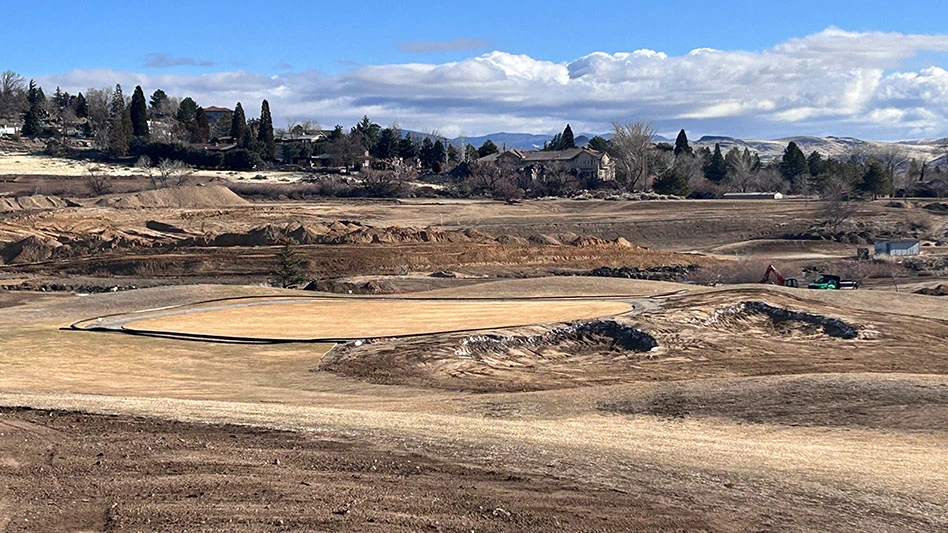
The first inkling this might be different than the typical Wednesday morning education session arrived when a powerful man entered a conference room at the Embassy Suites in Murfreesboro, Tenn., dressed as a law enforcement officer.
Those who didn’t know Cherokee Country Club superintendent Jason Sanderson could have easily confused him with an actual officer. The man who then entered the room to anticipation wore a robe and showed no apprehension. Chris Sykes created, developed and honed the Tennessee-style turf court. He knew those involved well enough to understand a mock trial pitting ultradwarf Bermudagrass vs. bentgrass greens could generate buzz for the 50th Tennessee Turfgrass Association Conference & Tradeshow.
Sykes, the superintendent at Toqua Golf Course in Loudon, spent 2 hours, 56 minutes bringing order to the Tennessee turf and the help he received from a shrewd panel could redefine how associations view educational offerings. Instead of using solo presenters and PowerPoint to assess the pros and cons of Transition Zone putting surface options, the TTA resorted to a judge, bailiff, legal counsels and witnesses. For oaths, witnesses lowered their hand on the “Beard Bible,” Dr. James Beard’s “Turf Management for Golf Courses.”
“I have been thinking about this for several years in a debate format,” says Sykes, a member of the TTA educational committee. “And it just came to me the perfect forum for this debate format would be a courtroom setting which would provide structure and a setting for the debate.”
The mock trial was held on Wednesday, Jan. 13. Planning started last November, with members of the Bermudagrass and bentgrass teams meeting several times before arriving in Murfreesboro.
One of the biggest pre-trial considerations involved selecting the lead counselors. Chris Hartwiger, the director of the USGA Green Section Course Consulting Service, steered the Bermudagrass case by providing observations from years of visiting Tennessee golf courses. University of Tennessee assistant professor Dr. Brandon Horvath brought academic and scientific perspectives to the bentgrass counsel.
Hartwiger and Horvath were in difficult spots, because their professional reputations hinge on providing objective analysis. “My first reaction was one of terror,” Hartwiger says. “As a consultant, I always want to bring the full breadth of information to everybody and now I was required to argue one side. I feared alienating one portion of the group.”
Horvath sought guidance from a legal expert. He met with UT law professor Joan Heminway, who explained Tennessee’s mock trial procedures. “She got me to understand that a trial is a story,” Horvath says.
Still, winning the trial proved secondary. It became obvious midway through the event a hung jury would be the final result. Engaging audience members who invested time and money to attend the conference represented the primary goal.
“First of all, we wanted [turf court] to be educational,” Hartwiger says. “I wanted to structure it so we touched on different aspects of ultradwarf maintenance.”
The trial included numerous informative – and witty – presentations and exchanges.
Superintendent Paul Carter described the financial implications of The Bear Trace at Harrison Bay’s conversion from bentgrass to Bermudagrass. Bear Trace is a government-owned facility in a state park, meaning offering employees overtime pay to hand water and using fans to cool greens aren’t options.
On the humorous side, Trey Cutshall, the superintendent at The Farm Golf Club in Rocky Face, Ga., provided images of a boat he now has time to use in the summer because he’s managing Bermudagrass instead of bentgrass greens.
UT professor Dr. Sorochan served as the bentgrass side’s opening witness. He presented findings from his own research and data from Dr. Micah Woods to present a scientific case for maintaining high-level bentgrass greens in the Transition Zone. The Golf Club of Tennessee superintendent Jeff Huber shared text messages from PGA Tour player and club member Brandt Snedeker as evidence favoring bentgrass.
Syngenta senior technical representative Dr. Lane Tredway also took the witness stand. His testimony included a memorable cross-examination:
Hartwiger: “If the owner of a course in Nashville comes to you, what would your recommendation be?”
Tredway:“My recommendation would be to choose wisely.”
The closing arguments featured different approaches. Hartwiger explained changes since 2001 that led to Bermudagrass greens becoming a more viable option in the state. The three waves of change, according to Hartwiger: 1. Courses wanting to escape doom cycles caused by a variety of factors such as poor construction, small budgets and a lack of manpower; 2. Courses wanting to peak regularly instead of just at key periods; 3. Courses wanting to switch grasses as part of major renovations.
Horvath closed by inserting turf references into the Tom Cruise-Jack Nicholson “You Can’t Handle the Truth!” courtroom exchange from the early 1990s film “A Few Good Men.”
The jury left the room for four minutes before presenting its verdict...
There is no right or wrong answer to this debate. Everything is site specific and case specific. The biggest element for success are the people maintaining the turf.
Get curated news on YOUR industry.
Enter your email to receive our newsletters.
Explore the February 2016 Issue
Check out more from this issue and find your next story to read.
Latest from Golf Course Industry
- The Cabot Collection announces move into course management
- Carolinas GCSA raises nearly $300,000 for research
- Advanced Turf Solutions’ Scott Lund expands role
- South Carolina’s Tidewater Golf Club completes renovation project
- SePRO to host webinar on plant growth regulators
- Turfco introduces riding applicator
- From the publisher’s pen: The golf guilt trip
- Bob Farren lands Carolinas GCSA highest honor





